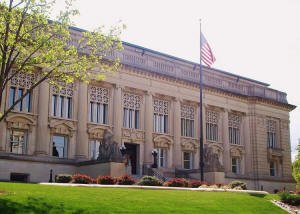Illinois Supreme Court rules transportation taxes can't be diverted
 Send a link to a friend
Send a link to a friend
 [April 22, 2022]
By Kevin Bessler | The Center Square [April 22, 2022]
By Kevin Bessler | The Center Square
(The Center Square) – Transportation tax
dollars must be spent on transportation projects. That is the result of
an Illinois Supreme Court ruling Thursday.
The Illinois Chamber of Commerce is applauding the decision on how
transportation tax dollars are spent by local governments.
The case revolved around the Safe Roads Act, also known as the
Transportation Lockbox Amendment, approved by voters in 2016. The
amendment requires governments to use transportation funds solely on
transportation work.
The Illinois Road and Transportation Builders Association challenged
Cook County diverting around $250 million in lockbox funds for another
purpose.
Filed Thursday, the court's majority opinion said "we find the language
of the Amendment to be plain and unambiguous, reject the County’s
interpretation of the Amendment as unreasonable, and find no issue with
the manner in which home-rule units have had their power limited in the
transportation context."

The Illinois Chamber submitted an amicus brief on behalf of the position
taken by the Illinois Road and Transportation Builders.
Chamber President Todd Maisch said the court ruled that the lockbox fund
must be used for transportation purposes, and there are no gray areas.
[to top of second column]
|

The Illinois Supreme Court Building in
downtown Springfield, Illinois. (Alan Scott Walker | Wikimedia via
Creative Commons)

“We are not going to allow you to nibble at the edges and try and call
something a transportation expenditure that is not truly a
transportation expenditure,” said Maisch.
Not everyone is a fan of the “lockbox amendment.” Ted Dabrowski, in an
article for Illinois Policy in 2016, said dictating how transportation
funds can be spent has no place in the Illinois Constitution.
“The Illinois Constitution’s purpose is to spell out the fundamental
rights of citizens and the basic operational structure of government,”
he wrote. "It’s not supposed to legislate or appropriate."
Even so, Maisch said the the Illinois Supreme Court ruling will have far
reaching implications.
“This is very important because it is the first major challenge that
will set precedent for years and years to come, so it is a much bigger
deal than dollars that were at stake on this one expenditure,” said
Maisch.
Kevin Bessler reports on statewide issues in Illinois for
the Center Square. He has over 30 years of experience in radio news
reporting throughout the Midwest. |